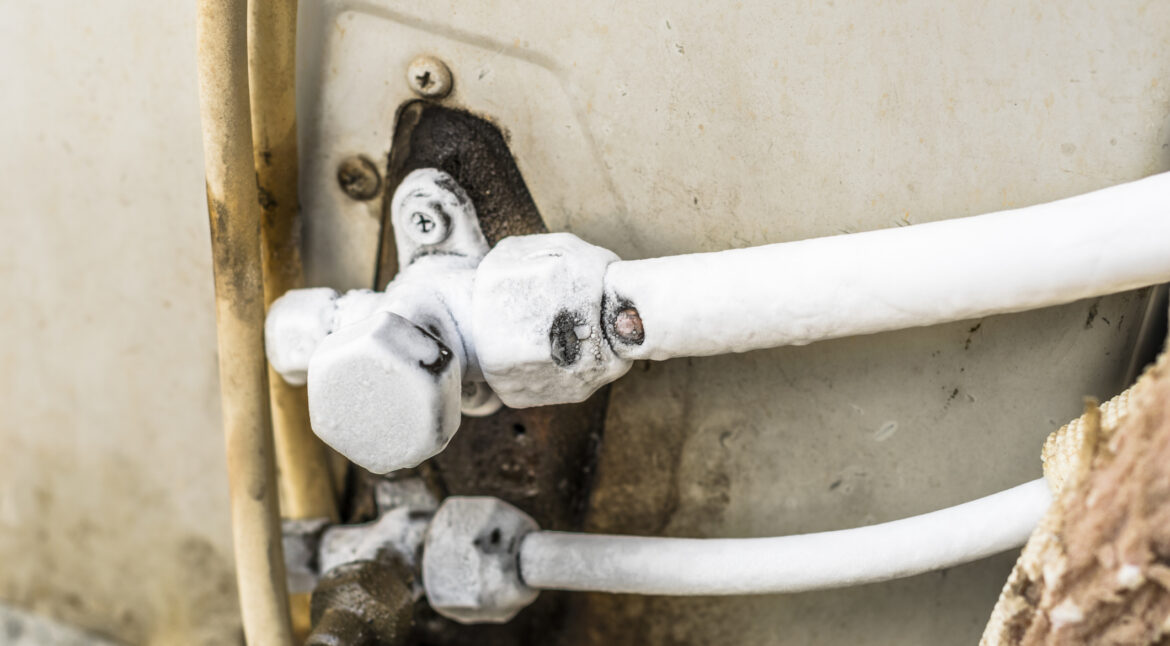Discovering ice on your air conditioner’s lines is a sure sign that something is wrong with your cooling system.
Frozen AC lines are not just a nuisance — they signal an underlying issue that can lead to bigger problems if not addressed quickly. Ignoring the ice can result in reduced cooling, higher energy bills and even damage to your AC unit. Understanding the causes and solutions for frozen AC lines will help you keep your system running smoothly and your home comfortable.
What causes AC lines to freeze?
Restricted airflow
One of the most common reasons AC lines freeze is restricted airflow. When warm air can’t move freely over the evaporator coil, the coil gets too cold, and moisture in the air freezes on the lines. Common airflow issues include:
- Dirty or clogged air filters
- Blocked or closed vents
- Dirty evaporator coils
- Obstructed return air ducts
Low refrigerant levels
Low refrigerant can cause the pressure in your system to drop, making the evaporator coil colder than it should be. This leads to ice buildup on the coil and refrigerant lines. Refrigerant leaks are not only a cause of frozen lines but can also damage your compressor if not fixed quickly.
Thermostat set too low
Setting your thermostat too low, especially during mild weather, can cause the evaporator coil to get colder than necessary. If the temperature drops below freezing, ice can form on the lines.
Mechanical issues
Problems with components like the blower fan, expansion valve or even the control board can disrupt normal operation and cause freezing. If the blower fan isn’t working, air won’t circulate properly, leading to ice formation.
Dirty coils
Dust and debris on the evaporator coil can insulate it and prevent heat transfer. The coil gets colder and colder, eventually freezing the moisture in the air.
Blocked or improperly sized ductwork
If your home’s ductwork is blocked or not the right size for your system, it can restrict airflow and create the conditions for frozen lines.
Solutions for frozen AC lines
Turn off your AC
If you notice ice on your AC lines, turn off the system immediately. Running the AC while it’s frozen can damage the compressor and other components.
Check and replace air filters
A dirty air filter is an easy fix. Replace it with a clean one to restore proper airflow.
Open all vents and registers
Make sure all supply and return vents are open and unobstructed. Move furniture or curtains that might be blocking airflow.
Allow the ice to melt
Give the system time to thaw naturally. Do not try to chip away the ice, as this can damage the lines. You can run the fan only (with the cooling off) to help speed up the process.
Inspect for obvious issues
Check for visible blockages, dirty coils or signs of leaks. However, most causes of frozen lines are best diagnosed and repaired by a professional.
Call a professional
Many causes of frozen AC lines — such as low refrigerant, mechanical failures or ductwork problems — require specialized tools and expertise. Attempting DIY repairs can make the problem worse or void your warranty.
Why call HVAC 911 for frozen AC lines?
Frozen AC lines are more than a simple inconvenience. They are a warning sign that your system needs attention from a qualified professional. Here’s why you should call HVAC 911 for a referral to a local heating and cooling contractor:
- Licensed and Insured Contractors: HVAC 911 connects you with local HVAC pros who are fully licensed, insured and highly trained.
- Expert Diagnosis: Contractors have the tools and experience to identify the root cause of frozen lines and fix it fast.
- Safe and Reliable Repairs: Professionals will safely unfreeze your system, repair leaks, clean coils and ensure your AC runs efficiently.
- Prevent Future Problems: A thorough inspection can catch small issues before they become big, expensive repairs.
- Peace of Mind: All HVAC 911 contractors have over 10,000 hours of training and undergo background checks, so you know your home is in good hands.
Schedule your AC service today
Don’t let frozen AC lines disrupt your comfort or damage your system. If you spot ice on your AC lines, act quickly — turn off the system and call HVAC 911 for a referral to a trusted local heating and cooling contractor.
Our affiliated licensed, bonded and insured contractors will guide you through the process and ensure all the work is done correctly. They employ highly qualified technicians who receive over 10,000 hours of training and undergo rigorous background checks.
